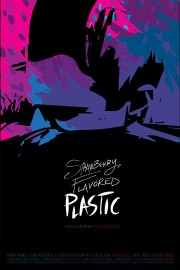Strawberry Flavored Plastic
“Strawberry Flavored Plastic” is a fascinating study in sociopathic behavior. The way Colin Bemis structures his film is brilliant in getting this point across without ever really casting judgement on the characters doing said behavior. This is a film worth discovering, and just witnessing in how it takes the idea of “found footage” cinema, and adapts it into something different than what that has come to mean. One of my first real 2018 films, it’s easily going to remain one of the best.
The film follows two documentary filmmakers- Errol (Nicholas Urda) and Ellis (Andres Montejo)- as they document the life of Noel Rose (Aidan Bristow), a man who had recently been released from prison for a crime of passion. On the surface, we come to see Noel as a relatively put together individual who has a clear view of himself as troubled, and hopes that maybe the documentary will help him through some of those issues. Throughout the process of filming, however, they realize that Noel’s back story is a fabrication, and his “issues” run far deeper than he initially let on. They continue with the process, however, even after discovering Noel’s “uncontrollable itch,” which makes Errol’s wife, Lana (Bianca Soto), deeply afraid for their safety, especially when Noel discovers he is actually a father.
The film I could not get out of my head in watching this was Errol Morris’s extraordinary documentary, “The Thin Blue Line,” about the murder of a cop in Texas, wherein he actually got a confession to the murder on-camera, which resulted in the man who had been originally charged with the crime being exonerated. I have no doubt that Bemis deliberately chose the name Errol for his filmmaker in homage to Morris, and it makes Errol’s actions and decision-making all the more dubious to watch. I imagine this film is akin to what might happen in Errol Morris not only ran into a real-life Dexter Morgan as a subject, but, rather than be responsible in how he handles such a revelation, he’s so enamored with his subject and his film that he throws caution to the wind, and sets out to make his “In Cold Blood.” True, Morris has filmed some questionable characters over the years, but the course of their lives had already made him less responsible, legally, for the revelations he gets out of them. The Errol in this film has no sense of responsibility, and when he and Ellis cross a line Noel has asked that they not cross, you’re kind of on his side with the way he reacts. Do we approve of it, morally? No, but we understand it emotionally.
There’s so much to say about the arc of this story, and yet, so much I refuse to reveal, because this film works best as a narrative discovered rather than laid out in a review. Like one of Morris’s documentaries, Bemis’s film sucks us in with each frame, and we find ourselves engrossed by the individuals on-camera, regardless of how we view their behavior from an ethical standpoint. I don’t agree with Noel’s choices, but I’m fascinated by the way he rationalizes them. I think Errol and Ellis are irresponsible with the way they continue with this documenting of Noel’s life rather than just alerting the authorities, but it’s compelling seeing how they just let Noel’s disturbing behavior go unchecked, and seem to just let it wash off of them because, the film they’ll have at the end will be all the better with it. These are not good people, but they are great, complicated characters, and Colin Bemis has made a profound statement on the nature of art, and the human condition, in the exceptional film he has made telling this story. You won’t be able to stop watching it.










